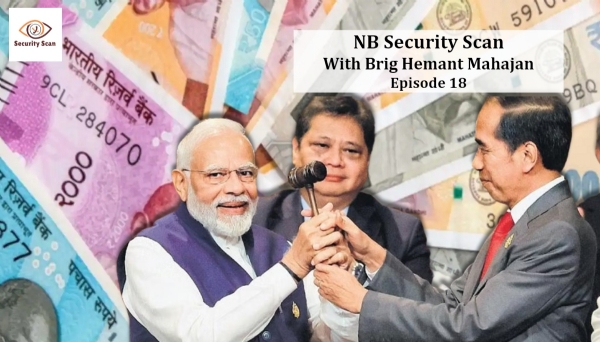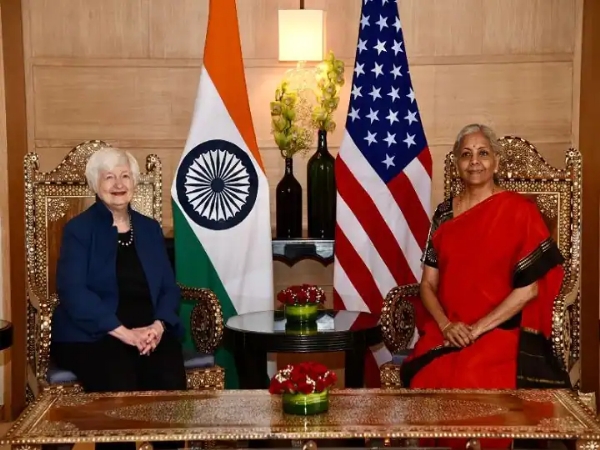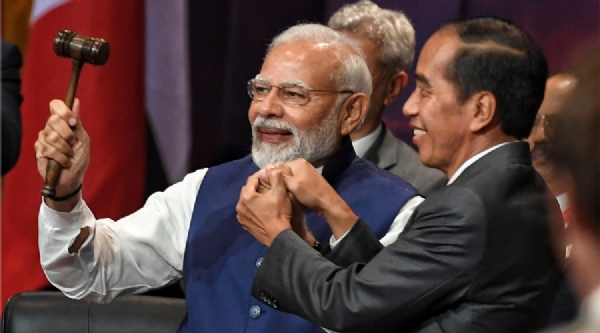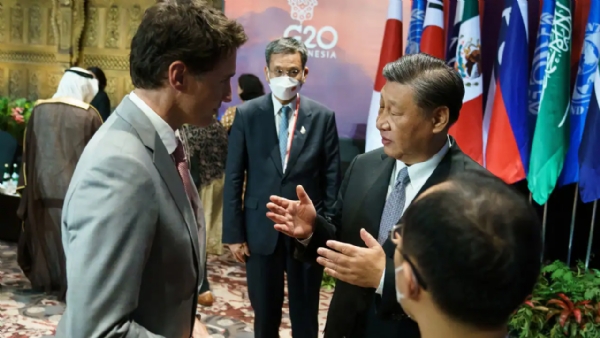#SecurityScan 18: 'No Money for Terror', India's G20 Presidency and Cinema's soft power
At the global security conference, ‘No Money for Terror’, PM Modi said that “must be a cost imposed on countries that support terrorism”.
Total Views |
This article is a summary of important events that have taken place in last one week affecting, India's national security.

News In Brief
- Instances of drones bringing drugs, arms and ammunition along the Punjab and Jammu borders from across Pakistan has more than doubled in 2022 and the BSF is looking for a foolproof solution, the force's Director General Pankaj Kumar Singh has said. While the BSF detected about 79 drone flights along the India-Pakistan international border in 2020, it increased to 109 last year and "more than doubled at 266 this year".
- Amid reports of Chinese buildup across the LAC, the Indian Army has built infrastructure for housing 450 tanks and over 22,000 troops in the Eastern Ladakh sector opposite China.Presently nine tunnels which include a "2.535 Km long Sela tunnel, which will be the highest bi-lane tunnel in the world are under construction. 11 more tunnels are also under planning."This will improve Indian Armies capability tremendously.
- Indian Army primed for indigenous modernisation: Vice Chief of Army Staff "Indian Army has recognised the importance of private sector in defence manufacturing. We want participation of the private sector," Lt Gen Raju said.
- Resources around the world are limited, the defence minister has said, and emphasised on exercising "financial prudence" in using them. Resources should be used at the right places and there should be no wastage, he added. "A penny saved is a penny earned, and this applies fully to resources too.
- Illegal migration, cross-border activities major challenges along Indo-Bangla border: MHA.The government has decided to undertake the work of installation of floodlights in West Bengal, Meghalaya, Assam, Mizoram and Tripura along the India-Bangladesh border. Out of 3,077.549 km of border floodlight sanctioned, 2,681.99 km of work has been completed. The rest is to be completed by March 2023.
- India bats for free Indo-Pacific at EAS amid China's South China Sea claims.India's position was highlighted by Vice President Jagdeep Dhankhar who led India at the EAS Summit in Cambodia. China's territorial claims in the South China Sea region by creating islands and fortifying them has led to fears that such a move would impact freedom of navigation in one the world's busiest trade routes.
- Amid reports of Chinese buildup across the LAC, the Indian Army has built infrastructure for housing 450 tanks and over 22,000 troops in the Eastern Ladakh sector opposite China.Presently nine tunnels which include a "2.535 Km long Sela tunnel, which will be the highest bi-lane tunnel in the world are under construction. 11 more tunnels are also under planning."This will improve Indian Armies capability tremendously.
- Indian Army primed for indigenous modernisation: Vice Chief of Army Staff "Indian Army has recognised the importance of private sector in defence manufacturing. We want participation of the private sector," Lt Gen Raju said.
- Resources around the world are limited, the defence minister has said, and emphasised on exercising "financial prudence" in using them. Resources should be used at the right places and there should be no wastage, he added. "A penny saved is a penny earned, and this applies fully to resources too.
- Illegal migration, cross-border activities major challenges along Indo-Bangla border: MHA.The government has decided to undertake the work of installation of floodlights in West Bengal, Meghalaya, Assam, Mizoram and Tripura along the India-Bangladesh border. Out of 3,077.549 km of border floodlight sanctioned, 2,681.99 km of work has been completed. The rest is to be completed by March 2023.
- India bats for free Indo-Pacific at EAS amid China's South China Sea claims.India's position was highlighted by Vice President Jagdeep Dhankhar who led India at the EAS Summit in Cambodia. China's territorial claims in the South China Sea region by creating islands and fortifying them has led to fears that such a move would impact freedom of navigation in one the world's busiest trade routes.
INTERNAL SECURITY
SFJ Pannun announces next round of Khalistan referendum in Australian’s Canberra

A rocket-propelled grenade attack on Punjab Police in Mohali, installing Khalistan flags at the entrance of Himachal Pradesh assembly, threats to multiple Chief Ministers and other who's who via telephonic audio messages in recent months, all have been linked to the proscribed terrorist organisation, Sikhs For Justice (SFJ) founded by Gurpatwant Singh Pannun, operating out now of Canada.
On Tuesday, Pannun announced that the next round of Khalistan referendum will be held in the Australian capital of Canberra to express support for a separate Sikh-state.
Despite the SFJ being a banned organisation in India since 2019 and Pannu being declared a terrorist, countries like Canada, the UK and the US, with a sizable Sikh diaspora, have allowed the organisation to conduct anti-India activities.
In the Canadian city of Mississauga, the Sikh diaspora was made to vote over Khalistan referendum, a major irritant in India-Canada ties, the second in the country.
Last month, Interpol had rejected a request by India to issue a Red Notice against Pannun, saying Indian authorities have not provided sufficient information on him.
"Since these handful Khalistanis (radicals) have no base in India, they are doing referendum and propagating the Khalistan agenda just to establish their base overseas in western countries by raising funds from Pakistan intelligence agency ISI and similar agencies in China.
The western countries don't see any crime to prosecute Pannun and other hardliners as they think it will be a violation of the freedom of expression.
ECONOMIC SECURITY
US Treasury removes India from its Currency Monitoring List
The US Department of Treasury withdrew India from its list of significant trading partners on its Currency Monitoring List after two years. The macroeconomic policies and monetary practices of the nations on the list is kept under watch.
A nation is regarded as a "currency manipulator" if it appears on the US Currency Monitoring List. The US government designates nations that use "unfair currency practices" to their advantage in international trade as currency manipulators.
The US Department of Treasury listed the seven economies that are now under observation as China, Japan, Korea, Germany, Malaysia, Singapore, and Taiwan in its biannual report to Congress.

This (the removal from US’ Currency Monitoring List) means that the Reserve Bank of India (RBI) can now take robust measures to manage the exchange rates effectively, without being tagged as a currency manipulator. This is a big win from a markets standpoint and also signifies the growing role of India in global growth."
The RBI recently made decisions like buying dollars during times of surplus inflows and selling dollars during times of outflows to control currency rates amid the rupee's decline. Dollars rise can now be managed much better, which will help the country economically.
Reviving the Old Pension Scheme will turn the clock back on hard-won reforms
Few political parties are advocating a return to the old pension scheme. Beginning with Congress in Rajasthan and Chhattisgarh, similar promises have been made by the Aam Aadmi Party in Punjab and now by both these parties in the ongoing election campaign in Gujarat. This is unfortunate. Such proposals, driven by short-term political considerations, benefit only a tiny part of the electorate. Championed without an understanding of their long-term implications, or driven by a will to ignore the enduring consequences, they threaten to undo the hard-won policy gains. This will have disastrous implications for government finances.
The new pension scheme was based on the concept of “defined contribution”, fixing the contribution of both the government and the employee. Since its launch, the NPS has built a robust subscriber base. At the end of October 2022, the scheme had 23.3 lakh central government subscribers and 58.9 lakh state government subscribers. Then there are others, including 15.92 lakh subscribers from the corporate sector, and 25.45 lakh from the unorganised sector.
According to the RBI, states had allocated Rs 3.86 lakh crore in 2020-21 towards pension. This works out to around 26 per cent of their own tax revenue.This will reduce productive expenditure. The burden of funding these pensions will fall on future generations.This must be stopped at all cost.
The burden of funding these pensions will fall on future generations. Rather than focusing on the immediate return and relief, political parties need to take a longer term view, and resist the temptation for such fiscally imprudent moves.
WATER SECURITY
Widely regarded as one of the most authoritative voices on the Himalayas, John Keay has written that the Chinese are planning a series of Himalayan dams of such worrying scale that they must be halted’.
This will be dangerous for the water security of India and environmental security of Tibet and lower riparian nations such as India, Bangladesh and many Southeast Asian nations. India should therefore form an alliance with the lower riparian States which get water from the Tibetan plateau and stop China from building these Dams.
Countries Back Terrorism As Part Of Their Foreign Policy
Indian PM was addressing the third edition of ‘No Money for Terror’ international ministerial conference.

Giving a clarion call for uprooting terrorism by chocking all forms of support system, including financing and radicalisation, Prime Minister Narendra Modi on Friday lamented that certain countries supported the menace as part of their foreign policy. In his inaugural address to the third edition of ‘No Money for Terror’ (NMFT) international ministerial conference, Modi asserted that there “must be a cost imposed on countries that support terrorism”.
JOB SECURITY
There has been a lot of talk in global markets about the impending economic slowdown. Much of the decline in the economic momentum can be attributed to a precipitous decline in activity in the world’s largest economies — the US, Europe and China.Each of these countries also has some unique set of factors contributing to the slowdown.
A number of big tech companies have announced massive layoffs citing a slowdown in business growth and revenues. Reports suggest that Twitter has laid off about 50 per cent of its workforce after a change in its ownership. This was followed by tech giant Meta Platforms Inc. announcing plans to lay off about 11,000 employees. Other companies such as Microsoft, Salesforce, Oracle too have reportedly laid off employees amidst the worsening global macro landscape. There are reports that Amazon is planning to lay off 10,000 employees. More are likely to follow.
While the governments at their level are trying to reduce the pains of recession by various policy decisions but at individual level the only solution is flexibility of multitasking or capability to take on different kinds of multiple, temporary job for the sake of the family. Multi skilling is the order of the day.
The situation is serious for Indian employees of these companies in America and elsewhere who are on visa if they don't get a replacement job in next 60 days, they will have to leave USA and come back to India.
However this should not be considered as a disaster, as due to their higher qualifications they will be able to get suitable jobs in India and also contribute to India's technological progress.
EXTERNAL SECURITY
India has the opportunity to get the G20 back on track
The G20 leaders’ summit in Bali is of special significance to India. From next month, India will officially assume the presidency, host next year’s G20 meetings and most importantly set the agenda for the next annual leaders’ summit. G20 is a unique global body. Comprising 19 countries and the EU, it represents 85% of global GDP and 66% of the world’s population. In terms of composition, it’s well represented.

Designed to be a flexible body, without a permanent secretariat, decisions are based on consensus. 2008 and 2009 financial crisis laid the platform for subsequent agreements on sharing tax data to curb tax evasion. Since then, the core goal of improving the economic policy environment has expanded to tackling climate change and terrorism. But recent results are disappointing.
India has the opportunity to get the G20 back on track. It’s far too important a platform to be allowed to sink into irrelevance like some other global governance bodies. Framing an appropriate agenda that can be realised through concrete measures will create a more positive environment for the global economy.
India is determined to focus on women’s empowerment, health, green energy and food security to streamline an agenda for the group. As a world leader in pushing for renewable energy sources, India may be in a perfect position to initiate global actions in this direction to help with the massive effort needed to meet climate change mitigation goals.This is India’s moment – and it must make something substantive of it.
Russia Ukraine War Must End
India’s imprint was visible in the document that echoed PM Modi’s now widely quoted advice to President Putin – today’s era is not of war. Even as the G20 leaders met, Russia on Tuesday launched around 100 missiles into Ukraine – the largest such volley of strikes since the beginning of the war – targeting energy infrastructure. In fact, two of those Russian missiles may have strayed into Poland, killing two people and highlighting the risk of escalation.
But a realistic end to the war is nowhere in sight. If India is able to stop Russia- Ukraine war it will be a tremendous achievement not only for India but for the whole world and it will put the world economy back on the track. India therefore must work to use its diplomacy to stop the war.
Canadian PM Justin Trudeau and Chinese President Xi Jinping engage in heated exchange of words on G20 sidelines

Many countries are now standing up to the bullying by the Chinese. During the coronation of Xi Jinping no major world leader was present except the Chancellor of Germany. This is a good news and shows how China is being isolated.
India-UK trade agreement On Track
India will soon commence the next round of talks over a free trade agreement (FTA) with the United Kingdom. On the agenda is securing a patent regime against ever greening by pharma companies, seeking easier work visas as well as access to Indian movies in the region under the proposed FTA.Talks were derailed due to UK home minister Suella Braverman's comments over Indians overstaying their visas.
FTA will improve imports and exports between India and UK helping both countries.
USING SOFT POWER TO SHOWCASE INDIA
How We Can Harness Indian Cinema’s Soft Power In Nation Building (Extracted From Shree Vinay Sahasrabuddhe Article)
With the rise of internet-based content, we need to go beyond cinema. The world is changing rapidly and if culture is going to be a valued commodity, it is important to begin investing it constructively in nation-building through various channels of its export.
Cinema influences. For a long time, as the only source of information about other cultures, it acted as a powerful device to build a perception about “others” in the increasingly globalising world. Soft power comes from culture, political values and foreign policies. If a country or its people are regarded or admired more than others, it carries a greater soft power.

Recently, the Indian Council for Cultural Relations and FLAME University, Pune jointly organised a seminar on this subject with several scholars and practitioners sharing their assessment of this very important, but often ignored theme. Several ideas emerged.
It is important to go beyond Bollywood. This year, regional cinema has grossed more than pan-Indian Hindi cinema.
OTT platforms have shown that subtitling works. Indian cinema producers need to tap newer markets by providing subtitled versions in all neighbor hood languages. Passionate lovers of Indian movies and movie stars in outside India want Indian movies and TV serials but understandably subtitled in their mother tongues. AI-assisted technologies could be leveraged for this.
Indian film music should find its way into ordinary streets, restaurants and public spaces abroad. Airlines and hotels in India can promote Indian music.
Indian cinema has to begin engaging, evolving strategies, events and partnerships that expand viewership.
Technology in cinema is changing the way movies are made and distributed. Indian cinema can take the lead in various global movies made with Indian collaborations.
It would be a good idea to incentivise the production of a special category of movies, say, movies promoting an understanding of Indian culture.
Portrayals of the country need to be balanced where deprivation is not exploited for business. There is a need to challenge the deep-rooted colonial consciousness that often surfaces on movie screens, giving rise to what one may call “cinematic colonialism”. In glorifying poverty and disregarding the ongoing efforts to overcome it, we show the India that the West wants to see. This must stop.
Actor Manoj Kumar understood the ‘soft power’ of patriotism in movies, and that is how Bharat Kumar came into being. The Model Film Policy must focus on creating a framework for “ease of filming” in India. With the rise of internet-based content, we need to go beyond cinema. The world is changing rapidly and if culture is going to be a valued commodity, it is important to begin investing it constructively in nation-building through various channels of its export.
---


